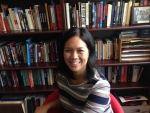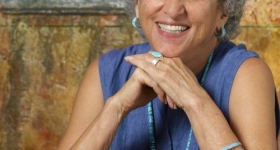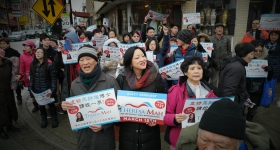We all know the gesture, the words now: Khizr Khan thrusts his pocket constitution at 28 million television viewers of the Democratic National Convention. Ghazala Khan stands beside him in traditional Pakistani clothing.
"Donald Trump,” Khizr Khan says. “Have you read the United States Constitution?"
A political-convention mic drop, Variety’s Sonya Saraiya called it.
“Legendary,” said media commentator Arsalan Iftikhar, aka The Muslim Guy.
It was the Joseph Welch-Joseph McCarthy moment for our generation: "Have you no sense of decency, sir?"
The Khans’ time in the spotlight as Muslim immigrant Gold Star parents seemed to mark a decisive turning point in Trump’s presidential campaign. Every petty attack Trump spat at them, the Khans returned with level-headed resolve—much to the Republican leadership’s horror. Khizr Khan’s speech made history; it exposed hate and Islamophobia for what they were: un-American.
But it was Ghazala Khan’s quieter protest that really spoke to me as the daughter of immigrants from Taiwan. After Trump implied that she did not speak on stage because “she wasn’t allowed to have anything to say,” Ghazala Khan spoke out, in the Washington Post and in multiple interviews, telling Trump and the world, “I am a Gold Star mother. Whoever saw me felt me in their heart.”
Powerful words—and yet it was the poetic immigrants’ diction in the less-quoted portions of the op-ed that grabbed my attention. “You can sacrifice yourself, but you cannot take it that your kids will do this,” she wrote. And later, describing her son Humayun’s volunteer work teaching disabled children to swim, she quoted him: “I love when they have a little bit of progress and their faces, they light up. At least they are that much happy.”
In these words, in the Khans’ accented English, even in the fact that their last name has been assimilated into an incorrect hard “K” sound—surely a resignation to too much butchering of the Urdu/Hindi “Kh,” an American indignity so common that it became a motif in the Indian film, “My Name is Khan”—I saw my own parents.
Like the Khans, my parents made sacrifices to secure a U.S. graduate school education, residency, and citizenship that would give their present and future family opportunities they could not have known as working-class people in their home countries. They have survived and acculturated in predominantly white communities where their English was mocked, their names garbled, and their loyalty and customs questioned.
In Ghazala Khan’s careful words, I heard my mothers' speech—and her weariness at having to defend her own non-Christian religious beliefs against assumptions about gender and culture. Ghazala Khan was all of our mothers saying, "Do not dismiss me. Do not treat me like I am invisible or unable to speak for myself because I am a female immigrant who speaks with an accent."
My parents, and the Khans, were taught by the model minority myth that staying quiet and being obedient to powerful white Americans were the keys to success in the United States. For so many years, they did. In many ways, it was left to us, the American-born second generation, to be the outspoken activists.
How many times did my mother nudge me toward the customer service desk, or my father ask me to write a letter for him, saying, “You, you tell them what I want. You speak good English. They’ll listen to you”?
The Khans’ son was killed in Iraq. He could not speak for them anymore. So they spoke up.
Arsalan Iftikar is a second-generation Pakistani American, and an author whose latest book, “Scapegoats,” addresses Islamophobia. “As proud American Muslims of Pakistani descent,” he said, the Khans represent “a new narrative on 'model minorities' who have a greater understanding of our Constitution than the Republican presidential nominee."
We have many narratives to rewrite. Intersectionality is still a new concept in post-Civil Rights America. Usually, we get to be only one identity in the public eye. I embrace that the Khans' public defiance against Trump was, and should be, absolutely a milestone for Muslim Americans. Yet we must come to a new understanding that identities overlap with and multiply each other, rather than cancel each other out.
The Khans are Muslim Americans and Pakistani Americans. When the Khans’ audacity put a crack in Trump's gold-plated façade that spread over the coming weeks, the pride was equal for both groups.
Some of us may be cynical that Hillary Clinton and the DNC cast the Khans in an act of political theater. Or we may argue that the Khans might have been equally justified in questioning the bipartisan vote that put their son at the front lines of an unjustified war against fellow Muslims. I certainly had those thoughts, even as I celebrated.
But like identity itself, the public dialogue about discrimination and hate speech is knotty and messy. And if it takes a little theater to fight the ever-changing marquees of Trump’s hate show, then bring it on. I prefer the Khans' brand of complexity—and sincerity—to Trump's lack of both.
The Khans’ six minutes and one second on the DNC stage was about far more than Donald Trump. Theirs was a moment in which the first-generation Asian Americans, so often dismissed and assumed to be silent, spoke up and were listened to. They inspired support, respect, and even fear and hate among some.
Ultimately, they claimed things that we have seen our parents too often sacrifice: Power, and dignity, in the face of white America.










Comments